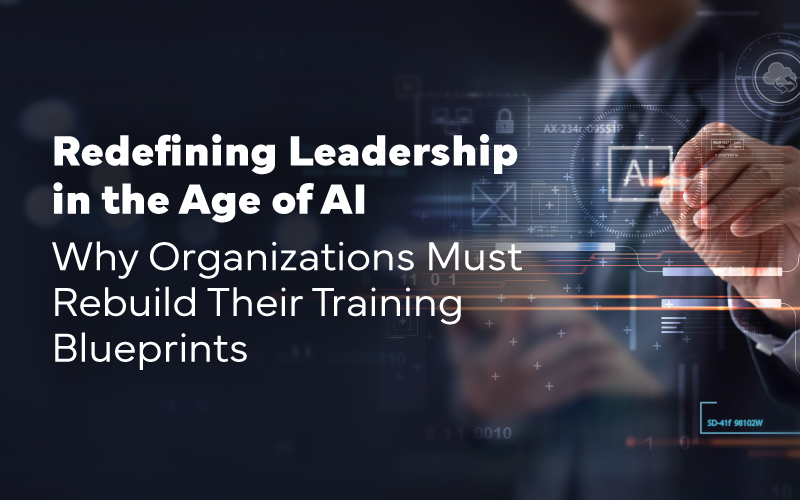As artificial intelligence (AI) reconfigures the workplace, the very DNA of leadership is evolving. What was once a fixed set of skills (strategic thinking, delegation, vision) is now being augmented at scale by emotional intelligence, data fluency, and adaptability. In this era of disruption, organizations that cling to legacy models of leadership training risk stagnation or irrelevance.
We’ve entered the age of augmented leadership, where AI doesn't replace leaders, but redefines what it means to lead.
The Leadership Gap in the AI Era
A McKinsey Global Institute survey found that 87% of companies worldwide reported experiencing skill gaps now or expect to experience them within the next five years, impacting productivity and competitiveness at both corporate and national levels.
Simultaneously, AI adoption is accelerating. Gartner predicts that by 2026, over 80% of enterprises will have used generative AI application programming interfaces (APIs) or models, and/or deployed generative AI-enabled applications in production environments.
Despite these trends, many leadership development programs remain rooted in outdated paradigms, failing to equip leaders with the necessary skills to navigate AI-integrated workflows, manage hybrid teams, or make ethical decisions regarding algorithmic tools.
Why Traditional Leadership Training Falls Short
Conventional leadership training often emphasizes hierarchical progression and static skill sets. However, the integration of AI into business processes demands a shift towards:
- Cross-functional collaboration: Leaders must work across departments to implement AI solutions effectively.
- Ethical adeptness: Understanding and addressing the ethical implications of AI decisions is crucial.
- Digital empathy: Leading teams that include both humans and AI requires a nuanced, interpersonal approach.
Traditional programs often lack real-time feedback mechanisms, rely on static content, and are unable to simulate high-stakes, AI-driven decision-making scenarios. This gap isn't merely operational; it's cultural. Leaders need to perceive AI not just as a tool, but as a collaborator or team member.
Organizations that proactively adapt their leadership development strategies to incorporate AI competencies will experience exponential growth and improvement. Benefits include:
- Enhanced decision-making: Leaders equipped with AI literacy can make more informed, data-driven decisions.
- Improved agility: Understanding AI enables leaders to respond swiftly to market changes and technological advancements.
- Increased innovation: AI-savvy leaders are better positioned to drive innovation within their teams and organizations.
Moreover, integrating AI into leadership training can lead to higher employee engagement and retention, as leaders are better prepared to support and develop their teams in a technologically advanced environment.
How AI Can Elevate Leadership Development
AI offers transformative potential for leadership training by:
- Personalizing learning paths: AI can tailor training programs to individual leaders' strengths, weaknesses, and learning styles.
- Simulating complex scenarios: AI-driven simulations can expose leaders to high-stakes decision-making environments, enhancing their problem-solving skills.
- Providing real-time feedback: AI tools can analyze leaders' interactions and offer immediate, actionable insights for improvement.
- Predicting performance trends: By analyzing data, AI can help identify potential leadership challenges and uncover opportunities for development.
These capabilities enable a shift from traditional, one-size-fits-all training to dynamic, responsive development programs that evolve with both the leader and the organization.
At ELB Learning, we’re not merely integrating AI into leadership development—we’re re-architecting how leadership is taught and experienced.
- Our immersive learning simulations place leaders in AI-rich scenarios, preparing them for real-world ambiguity.
- We use adaptive learning engines to track behavior change, not just knowledge retention.
- With platforms like Rehearsal, we provide asynchronous coaching, where leaders can practice key conversations and receive practical, AI-backed feedback.
- Most importantly, we infuse our programs with human-centered design, understanding that leadership, even with the aid of AI, remains an inherently human endeavor.
Whether it's developing empathy in a tech-first culture or leading through generative AI disruption, we design leadership learning that’s timely, ethical, and actionable.
Conclusion: Leading Beyond the Horizon
In the age of AI, effective leadership transcends traditional competencies. It requires a blend of technological acumen, ethical consideration, and human-centric skills. Organizations that invest in evolving their leadership training to meet these demands will not only safely navigate the complexities of the modern workplace but also drive innovation and growth.
At ELB Learning, we believe that great leaders are not just born or built—they are developed through intentional, forward-thinking training that embraces the possibilities of AI while honoring the irreplaceable value of human insight.









_Blog%20Featured%20Image%20800x500.png?width=388&name=Recap%209-4-25%20Why%20You%20Should%20Train%20Sales%20Leaders%20Like%20Cats%20(Not%20Dogs)_Blog%20Featured%20Image%20800x500.png)